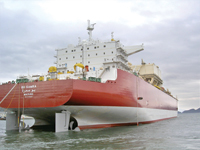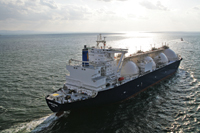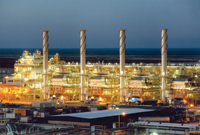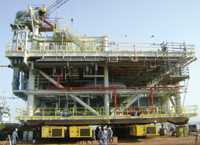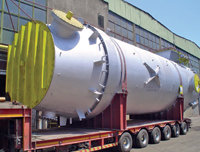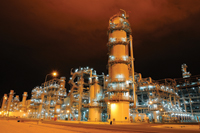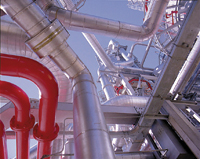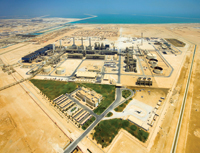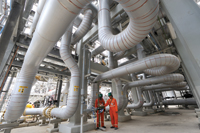
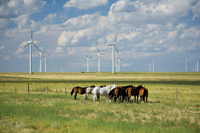 Qatar has bought a 6.2 per cent stake in the Spanish utility Iberdrola
Qatar has bought a 6.2 per cent stake in the Spanish utility Iberdrola
QATAR is scanning the globe for multibillion-dollar energy investments in hopes of diversifying its income and vastly expanding its international energy reach.
Qatar’s eagerness to expand abroad is driven by the kingdom’s robust foreign policy, a moratorium on new projects in its single biggest gas field, and a desire to protect itself from fluctuating demand and prices for natural gas.
Having achieved its goal of producing 77 million tonnes of liquefied natural gas a year, Qatar – the world’s biggest LNG exporter – is looking at projects in places like Russia and in industries like electricity, while increasing investments in high-consuming markets in Asia.
Analysts say the Qatari drive to diversify abroad is unlikely to ease because it is expected to stick to its moratorium on new projects in its North Field, the world’s biggest single gas reservoir, which Qatar shares with Iran.
In fact, the kingdom has said it will not lift the ban until at least 2013.
Qatar imposed a moratorium in 2005 for fear that rapid production could damage the reservoir. Although Qatar holds the world’s third-largest gas reserves, after those of Russia and Iran, nearly all of them are in the North Field.
‘‘If it doesn’t have the domestic resource to be able to expand its production, it has to look beyond its border,’’ said Julian Lee, senior energy analyst at the Center for Global Energy Studies in London. ‘‘That’s why it is looking to become a much more international player than purely a local one, and that’s what’s behind the interest in potential projects in Russia, Australia and growing investment in China.’’
Qatar’s policy of having stakes in various energy sectors and cooperating with rivals echoes its political approach of having good ties with friends and foes.
Qatar has expressed an interest in acquiring a stake in the Russian gas producer Novatek and its Arctic Yamal LNG project, which would be the first Qatari foray into an LNG production facility beyond its borders.
Investment in that project would also turn the two gas rivals into co-investors, at a time when Russia is ramping up its LNG output with an eye on Asia, while Qatar is counting on growth in Asian demand to offset a drop in LNG exports to other markets, notably the US.
An increase in US production of unconventional gas has thwarted Qatar’s ambitions in the US, the world’s biggest oil consumer. Qatar had so much faith in the US market that it even invested in an LNG regasification terminal there.
Meanwhile, Qatar is vying with Russia over Europe, whose debt crisis could threaten demand for LNG.
The Russians ‘‘have a very strong foothold in the Europe gas market and they are feeling competition from the Qataris,’’ says Samuel Ciszuk, a global oil supply consultant at the energy advisory firm KBC. ‘‘There is a benefit for having closer cooperation and some exchange of strategic goals and information with Russia, especially when you have such a big foothold in the market they have a foothold in.’’
 |
Gazprom ... boosting ties with Qatar |
Closer ties with Russia began to emerge last year. Gazprom, the state-owned Russian gas giant, said last year that it had been invited to participate in Qatar’s LNG industry once the moratorium on the North Field was lifted.
Both countries are members of the Doha-based Gas Exporting Countries Forum, a club of producers that share information on markets and projects. Russia and Qatar will be eager to align their gas policies in order not to undermine prices, which have taken a beating since 2008 with the onset of the global recession and a surge in North American gas output from shale rock.
Qatar is wary not only of Russia, but of the rising might of Australia, which is expected to dislodge the Gulf state as the world’s biggest LNG exporter toward the end of the decade. This may even prompt Qatar to look at investing in Australia.
‘‘Qatar has a choice between being a partner in projects that will compete with Qatar’s own LNG production, or it can see those projects go ahead on their own without Qatari involvement,’’ said Lee of the Centre for Global Energy Studies.
Involvement in international LNG ventures would be less risky than undertaking new projects in Qatar and creating a gas glut that would depress prices.
But analysts say one big impetus for Qatar to expand abroad rather than expand locally by removing the North Field ban may be its desire to placate Iran.
Tehran has struggled to tap its side of the reservoir because of a shortage of technology brought about by ever-tightening international sanctions over its nuclear programme.
Qatar and Iran have ‘‘straws in the same gas field, but only Qatar is sucking,’’ says Eckart Woertz, a visiting fellow at Princeton University. ‘‘It must be a worry for the Iranians that Qatar has built the largest LNG plants on the planet when their side of the field is still not developed.’’
The fact that relations between Shiite Muslim Iran and the Sunni Muslim Gulf states are on edge does not help.
Saudi Arabia and Bahrain have hinted of Iranian involvement in Shiite protests on their home turf this year, a charge Iran has denied. The Gulf region is not immune to the flaring of conflicts over energy resources. Saddam Hussein used the pretext of Kuwaiti siphoning of Iraqi oil from a disputed field to invade the Gulf state in 1990.
Qatar, though, has managed to maintain good relations with Iran, and President Mahmoud Ahmadinejad was expected to attend a meeting of the gas forum in November, though in the end he did not.
Peace with Iran is also necessary to maintain the safety of Qatari LNG tankers traversing the Strait of Hormuz, the world’s most vital energy channel.
Most recently, Qatar’s political involvement in Libya, where it helped arm the rebels and even marketed oil produced in areas held by the rebels, has led to speculation that Qatar is interested in being more than just a peacemaker.
‘‘Certainly playing a wider political role internationally has been important for Qatar,’’ Lee says. ‘‘How much is that driven by the commercial consideration and how much it is driven by broader political concerns within Qatar is unclear.’’
He adds: ‘‘There is a lot of good feeling in the new government circle in Libya toward Qatar and that may well translate into upstream contracts’’ and some kind of marketing relationship with Libya.
Although analysts caution that it is too early to tell if Qatar will reap the benefits of its Libya gamble, the country’s huge energy reserves and proximity to Europe could prove helpful to Qatar in the future.
With or without Libya, Qatar’s energy tentacles are still expected to aim for new corners.
This year, Qatar bought a 6.2 per cent stake in the Spanish utility Iberdrola, giving it access to European power markets, big wind-power projects and the potential to tap high-growth areas like Latin America, where Iberdrola has acquired a Brazilian power distributor.
Qatar also signed an initial agreement with local Chinese authorities, the Chinese state-run oil company CNPC and Royal Dutch Shell to be part of a petrochemical and refining complex in China, the world’s second-biggest oil consuming nation.













































































